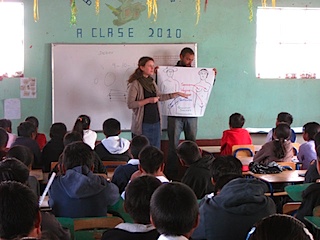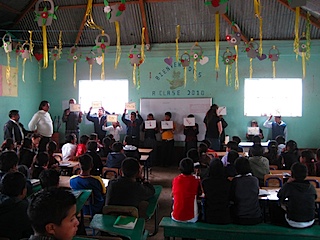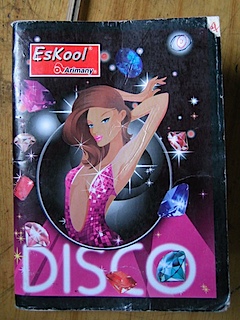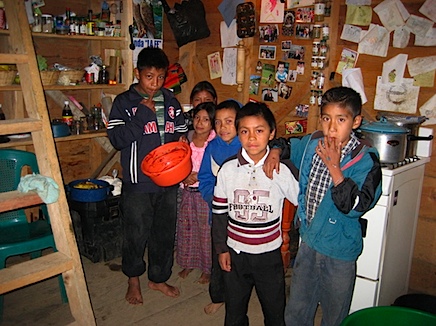Somehow, in the midst of all our SPA construction, I managed to find yet more for us to do–I planned health fairs at the school. Soon after we arrived in our village, almost two years ago, the teachers asked if I would help them with sex education. They said they’d had a hard time getting support from parents to talk about such a delicate subject, but that maybe the parents wouldn’t mind if we were the ones talking? This was way back when I understood nothing of the way things work here, which means I thought they would come to me with more specifics when they really wanted me to help. Hah, things definitely do not work like that here. This unrealistic expectation, along with the fact that we were incredibly busy for our first year meant that it took me this long to set up anything to do with health and sex ed at the school. As some of you may remember, working at the school has been a bit of an internal battle for me.
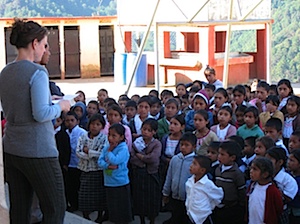 The first time we tried to establish regular health talks in the school, things went quite badly. I came away completely deflated and so uncertain as to how I should proceed that, well, I just didn’t. I had fancied myself as being good with kids, but Guatemalan kids in a school setting are drastically different from American kids in a school setting. In the US, teachers encourage student participation from the very beginning. We are trained to answer questions and then make up our own. This in combination with the fact that the US is so individualistic means that we, as Americans, are generally people who have an opinion and know how to share it. This is not the case here in Guatemala. Participation in the classroom is almost nonexistent. There is no information exchange or feedback from students. Educators have been trained by rote memorization and they teach with rote memorization. Being from a very communal culture, it’s very unlikely that students will ask insightful questions or even feel comfortable responding to simple review questions, as this puts them in the spotlight. The problems I had at the school were mostly my own. I didn’t know how I was supposed to work with no feedback. Somehow I’d learned how to deal with that when it came to giving health talks to the women, but seeing it all over again in young students was thoroughly discouraging. It was especially difficult given that I’ve spent time with a lot of the students outside of the classroom where they are curious, they do ask questions, they do speak–maybe not a lot–but much more than they do in school.
The first time we tried to establish regular health talks in the school, things went quite badly. I came away completely deflated and so uncertain as to how I should proceed that, well, I just didn’t. I had fancied myself as being good with kids, but Guatemalan kids in a school setting are drastically different from American kids in a school setting. In the US, teachers encourage student participation from the very beginning. We are trained to answer questions and then make up our own. This in combination with the fact that the US is so individualistic means that we, as Americans, are generally people who have an opinion and know how to share it. This is not the case here in Guatemala. Participation in the classroom is almost nonexistent. There is no information exchange or feedback from students. Educators have been trained by rote memorization and they teach with rote memorization. Being from a very communal culture, it’s very unlikely that students will ask insightful questions or even feel comfortable responding to simple review questions, as this puts them in the spotlight. The problems I had at the school were mostly my own. I didn’t know how I was supposed to work with no feedback. Somehow I’d learned how to deal with that when it came to giving health talks to the women, but seeing it all over again in young students was thoroughly discouraging. It was especially difficult given that I’ve spent time with a lot of the students outside of the classroom where they are curious, they do ask questions, they do speak–maybe not a lot–but much more than they do in school.
Feeling discouraged was just part of the battle. The rest of me just felt guilty, because the teachers here have been nothing but supportive of our presence and work in the community. But since I felt at a loss of how to approach things and completely unmotivated, I let it slide. Maybe I shouldn’t have done that, but I did. Anyway, when things got REALLY slow here a few months ago, in April or so, I went to the school again to talk to them about how they thought we should work together. Even then, looking at our scheduled meetings and obligations combined with their teacher meeting days and celebratory days off it was obvious we couldn’t establish a weekly routine, so we decided to do a couple of health fairs. I still don’t know how these fairs were pushed so far into the calendar that they landed right in the middle of construction, but that’s Peace Corps scheduling for you. Everything takes much longer than expected.
While these health fairs weren’t as big and exciting as our December community health fair for education and prevention of HIV and AIDS (we didn’t get to burn any more devils…), I think they were quite successful. The first Friday health fair was for kindergarten, first, second, and third graders. There were over 150 students participating, which meant that we needed to call in reinforcements. Katal and Nico, our closest volunteer friends, came to the rescue. They’d also helped out with the December activity. The theme of the day was Mi Vida es Preciosa, or My Life is Precious. We opened up the day talking about how all of us are precious, and because of that we need to take care of ourselves. Personal responsibility is kind of elusive here in a lot of respects, so I have no idea how our message went over, but we talked about how all of us have the responsibility to take care of our health. It’s not your Mom’s responsibility to wash your hands every time you should wash them, or to brush your teeth every time you should brush them. We had four Fun Stations where we talked about nutrition, oral hygiene, hand washing, and clean water. The student groups rotated classrooms with their teachers. The teachers were our translators. These grades are too young to understand Spanish very well, so as usual, every word we said was translated.
An interesting side note: since school was declared free of charge and open to all just before the start this school year, I think the enrollment in our school has a increased between a third to half the number of students the school previously catered to. This compulsory education decree has also meant that kids start school when they’re ten or twelve years old, so that a first grade class will have a few students who are twice as old as most of the first graders. Knowing this in advance, it made me wonder how many students would be bored and aloof because all the information and activities were geared toward young children. In the end, this didn’t seem to negatively affect participation at all.
I was a little worried about how things would go, but for the planning of the fair I decided we needed to pack it with movement, stories, songs, and games while completely avoiding direct student questions. I’d also met with the teachers prior to the fair to discuss their participation, i.e. we weren’t having a fair to give them a half day in the teacher’s lounge. We were having the fair to introduce them to some new ideas and techniques we use for teaching and maybe they would like to adapt them to their classrooms. And we needed them to stay with their class through the duration of the fair to make sure that the students understood everything and to maintain order… I think it worked?
It was an interesting morning. Some of the teachers were incredibly enthusiastic, fun translators. Though it struck me how not a single teacher tried to regulate male/female participation. Boys obviously dominated the scene as long as I didn’t make rules to counteract this. It was interesting, because I felt like some of the teachers were surprised when I enforced equal participation. It shouldn’t be shocking right? I mean, look at the gender divide among adults here, but it was striking. I’ve heard the school director, Minor, a giant ladino who lives in town, talk on several occasions about gender roles and how they are changing and must continue to change. Hah, the first time we spotted Minor down in the school yard while looking out our window some time in the first week here, Jaime jokingly said, “He ain’t from around these parts.” He dresses in a distinctly European style; he has neatly trimmed, but stylishly long hair; and both of his ears are pierced. This in addition to standing over six feet tall and having a sizeable belly, makes him outlandishly different looking. So maybe I was just surprised that the teachers under his direction weren’t more aggressive about gender equality in the classroom?
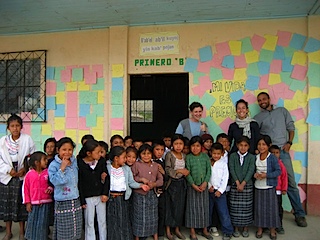 Anyway, I think this technique of keeping the students busy while not asking any direct questions was effective. All four grades attended all four activities and then we closed the activity by asking general questions to everyone where there were collective Yes!’s and No!’s. All of the students made a promise, as much as that means coming from a bunch of elementary students, to take care of their health. They drew their hands on a piece of paper and signed their name to affirm that promise. Then they ran off screaming, laughing, and pushing their way to recess! Later that afternoon during Chalio and Alberto’s daily visit, I asked them if they had fun, and if they thought the other kids had fun too. They said yes, pretty convincingly.
Anyway, I think this technique of keeping the students busy while not asking any direct questions was effective. All four grades attended all four activities and then we closed the activity by asking general questions to everyone where there were collective Yes!’s and No!’s. All of the students made a promise, as much as that means coming from a bunch of elementary students, to take care of their health. They drew their hands on a piece of paper and signed their name to affirm that promise. Then they ran off screaming, laughing, and pushing their way to recess! Later that afternoon during Chalio and Alberto’s daily visit, I asked them if they had fun, and if they thought the other kids had fun too. They said yes, pretty convincingly.
Oddly, the teachers disappeared as quickly as the students at the end of the activities. Who knows what they thought of the day? It’s so hard to get feedback, to maintain a dialogue here. I have to say it’s probably one of the most frustrating things about working here. Our job necessitates feedback and dialogue to make sure things are working and to help us improve, but it’s like pulling teeth to get most people to say anything, and then they just say, “Thank you! Thank you for this opportunity,” in a very pre-programmed kind of way. So who knows how that went over?
You know what happens when you get older? Suddenly health lessons are much more embarrassing.
Back to the school director. We’re big fans of the Minor because he not only talks a good game, but for the most part he lives what he says. The other day I walked into the school kitchen before the Teacher’s Day activities and found him helping one of the female teachers cut up a mountain of vegetables to be cooked for the afternoon meal. This might not seem like a big deal, but it’s crazy gender-bending around here. What is an even bigger deal is that while I’ve walked by the town tiendo after other activities for things like Mother’s Day or Independence Day to find fathers and teachers completely sloshed, smoking and drinking together, Minor has never been among them. He was the one who specifically asked that we help with sex ed, and he was with us for the entire 4 hour program on HIV/AIDS transmission and prevention for the younger students.
Once again, Katal and Nico came to support us with the upper grades. I now know that when they show up, I have nothing to fear because we’ve worked together enough on big lectures that everyone knows their parts. First Fletch and I would do the big lecture, which involves a plethora of graphic and embarrassing pictures, and then we’d split into game groups.
All four of us lead different games. For example, there’s a game called Globulos Blancos, or White Blood Cells, which explains how HIV is transmitted and what it does to the human body that leads to AIDS and death. It’s a really clever game, but I feel like I’ve led the game a million times in two years, so I begged Nico to do it–he didn’t make me beg very much. I led the call-and-response game that is meant to teach young adults how to resist pressure for sex from their boyfriend or girlfriend. That game and all the yelling took me back to my camp counselor days… One side of the room yells, “Everybody’s doing it!” and the other side yells, “I’m not everybody, I’m ME!” or they yell, “If you’ll do it I’ll marry you!” and the others yell back, “What if I don’t want to marry you?!” Other calls and responses, “If you don’t, I’ll leave you!” “I’ll miss you!” and then there’s a plea for using condoms, “I’d rather die than use a condom!” and the response is, “AIDS will kill you faster!”
While Nico led the White Blood Cells game and I taught kids how to cop an attitude and turn people down, Katal played a game that teaches what behaviors will and won’t transmit HIV and Jaime got to make kids run around in a True or False sprinting game with questions about the disease. Coincidentally, the bilingual education coalition had come to our school to observe teachers and demonstrate and discuss new ways to incorporate both Q’anjob’al and Spanish into their classes. They ended up participating in our program until they had to head back into town. It was fun to have extra, energetic teachers thrown into the mix, and great when we finished and they asked, “How can we do this in more schools? Can you all come work with us at the schools in town and in other communities?”
I think the best parts of the day were the moments MInor spoke. He really takes time for his students to impress upon them the importance of getting accurate information. He tied our lessons back into past health lessons he’d done with the students. He spoke at length about he idea of respect, respecting ones own body and the bodies of future partners. I find it encouraging any time we come in contact with someone like Minor. During the atol break, the students were absent from the classroom. The four gringos loitered, and then Minor appeared bringing us all cans of fruit juice and cookies from the tienda across the street. He and another of the head teachers, Pedro, came to thank us for the program. This is when Minor dropped a bit of a bomb, “You know, this, what we’re doing here today, is actually illegal if you look at the law books regarding what kind of sexual education is and isn’t allowed in schools. But it’s a law of ignorance. How does the government expect their students to progress if they refuse to give them important information that they definitely won’t get at home? That’s why I believe we have to give these lessons to the students.” Interesting! Up to this point, I wasn’t aware that there were laws governing what we could and couldn’t be taught in the schools here. I thought it funny to see someone take advantage of the incredibly lax enforcement of Guatemalan laws not for personal benefit, but to provide a more thorough education to his students.
Listening to Minor, I remembered that our friends in the Youth Development program talked to me once about how, when discussing birth control in schools, they’re only allowed to discuss the collar. The COLLAR is literally a ring of beads with a moving black plastic band that helps you track your fertility, for natural family planning. To me this is ludicrous. This method assumes that A) women are going to understand exactly how to use the collar and remember to move the plastic band every day, which isn’t a guarantee since so many women here can’t even remember to take a birth control pill regularly–they’ve told me as much. B) That they have 29-32 day cycles without a single irregularity, which is virtually impossible because most women’s cycles fluctuate from time to time for illnesses, fevers, complications from malnutrition, and external stress in their lives. C) That they have a say in when they have sex with their partners, which is infrequently the case in the areas where birthrates are the highest because there is a lot more machismo in the rural, less educated regions. If I think about it too much it starts to make me really angry, like abstinence-only education. It’s been proven ineffective for as long as it’s been tested, and still the policy persists in the US. And here I see the further devastating results of our ineffective American policies, when we have a tendency to push those foolhardy ideas on other countries, where people in turn suffer much greater consequences than we do for such shortsightedness. Let me tell ya, the US doesn’t have nothing on the teen pregnancy rates in Guatemala, nothing. So in the end I was just thankful that Minor had asked us to come in, and that we’d finally found a time to do it. Now he’s got the information and resources to repeat these lessons when and how he sees fit.
Minor excused himself, and the four gringos continued to loiter in the classroom. We were looking at all the silly notebook designs the students had at their desks. There was a particularly racey notebook cover, and Katal pointed out, “Eskool notebooks are the brand the government gives out to the students.” Isn’t that nice then, that they can hand out these kind of notebook covers, and still make it more or less against the law for students to receive sexual health lessons?
I’d say, thanks to the teacher support, that this health fair for the older students was definitely a small success. As the four of us walked back to the house to take a well deserved rest, we realized that, amongst all of us this was the first health talk we’d ever given entirely in Spanish with no translator. I think this is a sign that the school is doing some things right. You can tell from the looks on people’s faces and the recognition in their eyes, or lack thereof, if they understand what you’re saying. We could tell the students understood our Spanish entirely, and as exhausting as this very long and energy-intense lesson is, it was less tiring than the others we’ve done that were nearly twice as long as they might have been for all the Q’anjob’al translation. Go teachers!
As a side note, I thought this was also going to be our last health talk EVER, but I think I inadvertently scheduled another one with the Telesecundario students, the older students who are high school age, for July 8 while our replacement is here for her site visit. We just keep working, right up to the end, apparently unable to admit that we should be closing up shop sooner rather than later…oops. Better to be busy than bored, we always say.
Finally, some of you readers also have read the articles that are published here on the blog but were written for publication in my hometown newspaper. Way back in December, I wrote an article about literacy issues and the lack of books in Guatemala. Much to my delight, Candice Hinkle’s fifth grade class at Pioneer Elementary School, quite near my hometown, sent me an email the same day the article came out in the paper. They were surprised by the differences between their lives and the lives of students their age here in our village. It was shocking to them that some students here end school after sixth grade, whereas they were fifth graders and planning on at least seven more years of education. A pretty big difference. Anyway, they wanted to do something, and they asked if they could donate books to our school here. I was so touched by their email that I actually burst into tears. This always worries Fletch, the whole me bursting into tears thing, and since our work space is separated by a whole 12 inches and he was working along side me that day, he wondered what kind of bad news I’d just received. I assured him it was nothing to worry about, in fact it was very good news.
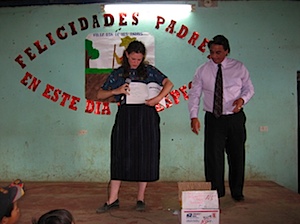 Through email exchanges, Mrs. Hinkle’s class began to coordinate their efforts, the students collected their pennies, and just before Christmas they sent off their scholastic book order for a load of books in Spanish. Don Livingston, from Computers for Guatemala, helped save the students shipping by letting them send the books to him in New York, where the books were loaded onto a boat with a computer shipment and slowly, very very slowly, they made their way through customs and we made our way down south to pick up the books. They arrived in our village just before we left for our COS conference. I had the pleasure of doing a video conference through skype with Mrs. Hinkle’s students, answering their questions about Guatemala and introducing them to some of their contemporaries here, Yohana and Chalio, before class was dismissed for the summer. Unfortunately, I didn’t have the opportunity to present the books to the school here before classes in the states ended. But, better late than never. Last week during the double celebration for Father’s Day and Teacher’s Day, I had the opportunity to present the books to the students and teachers and read the inscriptions from Mrs. Hinkle’s students. In case any of you are reading, I think the school was pretty excited for the more than 30 books you were able to pack into that box. Thanks so much for your contribution! Thanks for caring enough to do something.
Through email exchanges, Mrs. Hinkle’s class began to coordinate their efforts, the students collected their pennies, and just before Christmas they sent off their scholastic book order for a load of books in Spanish. Don Livingston, from Computers for Guatemala, helped save the students shipping by letting them send the books to him in New York, where the books were loaded onto a boat with a computer shipment and slowly, very very slowly, they made their way through customs and we made our way down south to pick up the books. They arrived in our village just before we left for our COS conference. I had the pleasure of doing a video conference through skype with Mrs. Hinkle’s students, answering their questions about Guatemala and introducing them to some of their contemporaries here, Yohana and Chalio, before class was dismissed for the summer. Unfortunately, I didn’t have the opportunity to present the books to the school here before classes in the states ended. But, better late than never. Last week during the double celebration for Father’s Day and Teacher’s Day, I had the opportunity to present the books to the students and teachers and read the inscriptions from Mrs. Hinkle’s students. In case any of you are reading, I think the school was pretty excited for the more than 30 books you were able to pack into that box. Thanks so much for your contribution! Thanks for caring enough to do something.
The night before Teacher’s Day was an exciting night in our house. Yohana, our friend from next door, had asked me a few weeks in advance if she could come over and bake a cake for her teachers. I told her I would definitely help her make a cake, but she had to keep reminding me because I was very busy, and she had to contribute the sugar, flour, and eggs. I told her if it was going to be a present from her then I wasn’t going to just make it for her. As the date approached she would stop by to keep checking if the rules or my schedule had changed, but the answers were constant. A few days before she came by to check again what ingredients she needed and to check and see if she could bring her school friends over to help as well. I said sure, and asked her if she’d decided on banana or chocolate cake? She asked if we could make both. I only have one big circular pan, so I told her if she added the bananas to her ingredient list and found another round pan then we could definitely make two cakes. I was really proud of how on top of things she was, much more than many adults here have been. As per usual, Fletch and I both worked late that night, but I got home before dark, and 15 minutes later Yohana showed up with her arms full of ingredients and her friends in tow. It was a crazy hour after a long time, but the kids were interested and involved in the whole process, and Yohana had brought her notebook to copy down the recipes. Here are the kids licking the chocolate cake batter out of the bowl shortly before going home. Oh, and don’t worry about the fact that they’re all barefoot. They aren’t too poor for shoes, we just make them take them off at the door because the mud lately has been ridiculous. They all put their shoes on and I handed them some plastic sheets to put over them as they made their way home in the rain. Yohana reported that the teachers very much liked the surprise.
Hanging around for the morning activities for the Teacher’s Day celebration got me an invite to play in the women’s basketball came for our teachers against another local school that had come to visit. There are onlly 4 women teachers here. I was quite the blocker, being at least a foot taller than most of the other players, but sadly I could not make a basket to save my life. Ah, my All Saints basketball days are so long gone…but I still received plenty of compliments on my playing from a lot of the female students. 🙂 The game was fun, but as soon as it was over, I had to run to the neighboring community and get back to work on stove construction. We are super crazy busy, and it will probably be that way to the very end.
